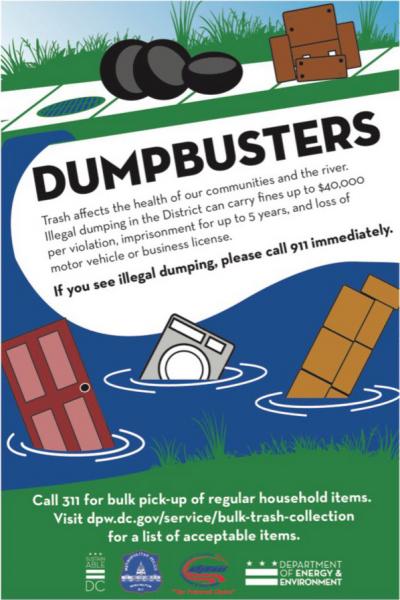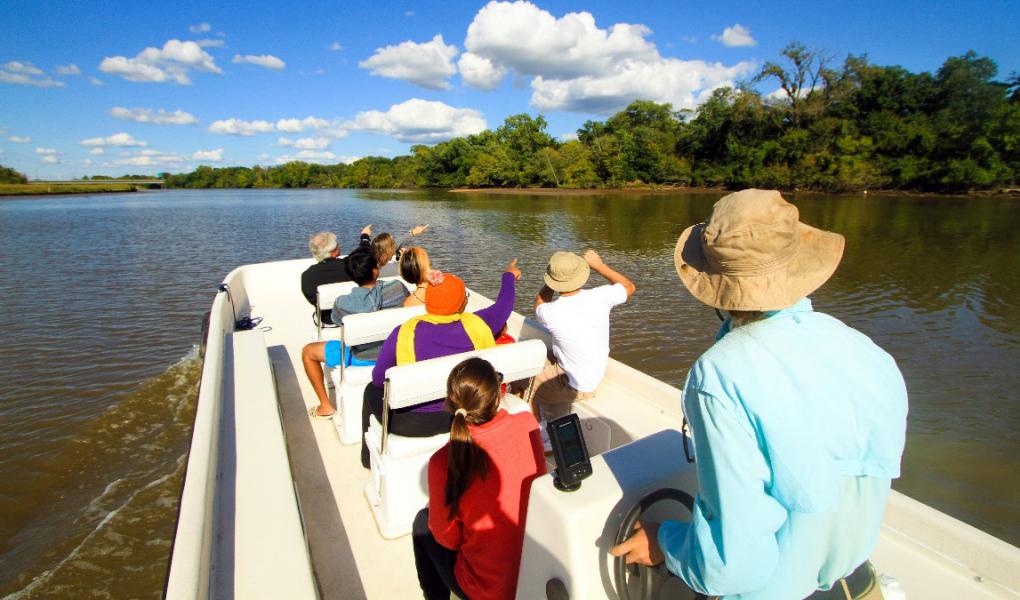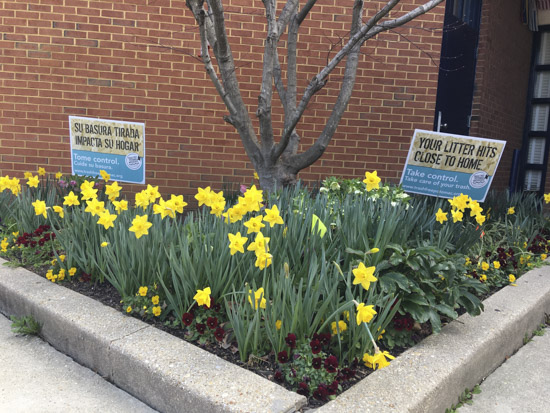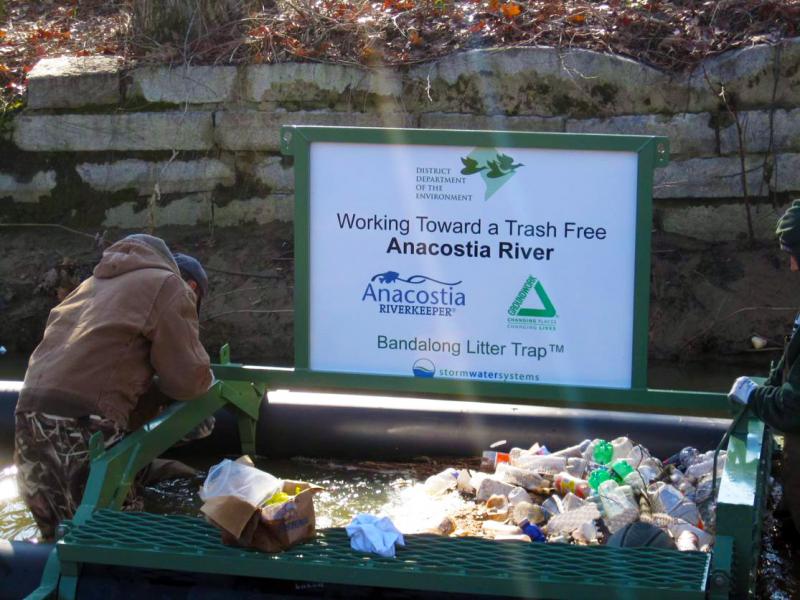
Have you ever walked down your block and noticed empty bottles, used straws, candy wrappers, or other litter? Did you know that not only is trash an ugly and annoying sight in our neighborhoods, but it washes from our roads, sidewalks, and playgrounds to our local streams and rivers any time it rains?
The Anacostia River, which starts in Prince George’s County, Maryland and runs through Northeast and Southeast DC, has a long history of problems with trash. Millions of people live, work, and play throughout its 176-square mile (456 sq. km.) watershed every day. Trash stops people from using the river as a place to recreate and enjoy themselves. In addition to being unsightly, plastic pollution harms our wildlife, rivers, and communities. Animals get tangled in soda can rings or strands of plastic, and fish and birds often mistake small plastic pieces as food. Most plastics are made from fossil fuels, and their chemical components can leech into the water along with toxic chemicals that stick to their surface.
The chemical bonds in plastic are more likely to break down over time as the result of exposure to sun, wind, waves, and increasing temperatures due to climate change. Furthermore, larger plastics can break down into microplastics (particles <5mm, about the width of a pencil eraser) and can be consumed by wildlife, entering the food chain and eventually ending up in humans via seafood.
DOEE knows trash is an important problem to address to protect our rivers and the life that depends on them. Education, research, policy, and trash capture are all important ways to help prevent trash from polluting our city. Scroll down to learn more about the important work DOEE and partners are doing to reach our goal of a Trash Free DC.
Policy and Enforcement | Education | Community Engagement
Trash Capture | Monitoring, Research, and Partnerships
Policy and Enforcement
The District has several laws and policies aimed at reducing some of the most common types of trash we see littering our neighborhoods and polluting our waterways, especially plastics. Many of these policies came about after a 2008 study on trash in the Anacostia River, funded by DOEE and conducted by the Anacostia Watershed Society
District laws and policies targeting trash include the Bag Law, the Foam Ban, and the Material Requirements for Food Service Ware, which include the ban on plastic straws and stirrers. More recently, the Zero Waste Act brought about the Utensils-by-Request law and the Ditch the Disposables grant program, both intended to continue reducing waste from single-use food service ware. DOEE is responsible for the outreach and enforcement of these policies.
DOEE also works across agencies to target trash. For the DumpBusters Illegal Dumping Enforcement Program, DOEE works with the MPD's Environmental Crimes Unit and DPW's Solid Waste Education & Enforcement Program on illegal dumping enforcement throughout the District. People are encouraged to call 911 if they see illegal dumping occurring. Read More>>
 Education
Education
Human behavior like littering or overfilling trash cans is a major reason for river pollution. DOEE has various efforts to educate our residents, students, and communities about the connection between trash on land and in the river, as well as best practices for reducing trash and changing the culture around littering.
- Meaningful Watershed Educational Experiences (MWEEs): Multi-day programs that teach students about their local watersheds and the Chesapeake Bay through classroom lessons, field experiences, action projects, and reflection activities.
- Anacostia River Explorers: These free, guided educational boat tours teach the public about the Anacostia River’s history, wildlife, environmental threats, and solutions helping it realize its full potential.
Community Engagement
People can be part of the problem when it comes to trash, but they’re also an important part of the solution! Members of the public interested in being part of cleanup efforts have many options to choose from, ranging from one-time cleanup events to longer-term commitments. DOEE funds local groups to organize cleanup events and students can earn community service hours for participating.
Trash Free Communities: This is a grant program that educates District residents about the harmful impacts of trash in their neighborhoods. The District has paused review of the applications accepted in spring 2024.
Community Stormwater Solutions Grants: This program provides funding for innovative, community-oriented and -inspired projects aimed at improving water quality in the District, including projects that address littering and reduce trash.
Anacostia Green Boats: Living Classrooms hosts free opportunities to paddle and clean the river during the summer months! This is a citizen science program focused on collecting marine debris from the Anacostia River. We'll weigh it, count it, and measure the volume of the various types of trash we collect while paddling. The data you help us obtain is critical to informing policy and education focused on reducing litter.
Want to get involved? There are many programs that can assist residents who want to organize a cleanup in their community. Helping Hands, managed by the Department of Public Works, can provide tools and trash disposal for individuals to conduct cleanups in their neighborhoods. Local partners organize their own cleanup events, including the ones listed below. Please reach out directly if you are interested in participating.
Residents also have the opportunity to adopt a block, stream, or park through the Mayor’s Office of Clean City’s Adopt - Your - District program
Local Partners Cleanup Events:
- Alice Ferguson Foundation Annual Trash Free Potomac Watershed Cleanup
- Anacostia Watershed Society Annual Earth Day Cleanup
- Ocean Conservancy International Coastal Cleanup
- Anacostia Riverkeeper Cleanups
 Trash Capture
Trash Capture
Since 2009, the District has installed nine trash traps throughout the Anacostia River watershed. Collectively, the traps have captured more than 70,000 pounds of trash and debris. DOEE uses revenue collected from stormwater fees and the Bag Law to fund community organizations through grants to monitor and maintain these devices.
In addition to trash traps, other ways the District government works to capture and remove trash from the watershed and/or the river include:
- DC Street Sweeping Program: A partnership between DPW and DOEE focuses sweeping efforts on “hotspot blocks” for trash in the watershed.
- Clean Teams Program: The District government provides grants to non-profit organizations and certified business enterprises hire unemployed residents to serve on Clean Teams in business corridors throughout the District, where they remove millions of pounds of trash and recycling annually.
- DC Water Skimmer Boat Program: DC Water operates a fleet of skimmer boats in the lower Anacostia River, Potomac River, and Washington Shipping Channel that removes hundreds of tons of trash and other debris annually.
Contact Jim Woodworth ([email protected]) for more information on the District’s trash capture efforts.
Monitoring, Research, and Partnerships
DOEE participates in ongoing research and trash reduction efforts with local and federal partners. For more information on these projects, contact Julia Wakeling ([email protected]).
- Total Maximum Daily Load (TMDL) for Trash: The District is one of the few jurisdictions in the nation with a TMDL for trash. A TMDL is essentially a diet for pollution that assigns, in this case, pollutant load reductions for trash to point sources (e.g., stormwater) and non-point sources (e.g., illegal dumping along streams). For more information on the District’s implementation strategy for the TMDL, please go to the DC Consolidated TMDL Implementation Plan.
- Microplastics Research: DOEE participates in several microplastics research projects, including with the Metropolitan Washington Council of Governments (MCOG) and Tetra Tech on monitoring aquatic habitat and fish species in the District for microplastics. DOEE also chairs the Chesapeake Bay Program Plastic Pollution Action Team, which is developing an ecological risk assessment for microplastics in the Potomac River.
- Annual In-Stream Trash Monitoring Program: DOEE and MCOG conduct monitoring annually at 13 sites along the District’s rivers and streams collecting count data and weight data on trash.

